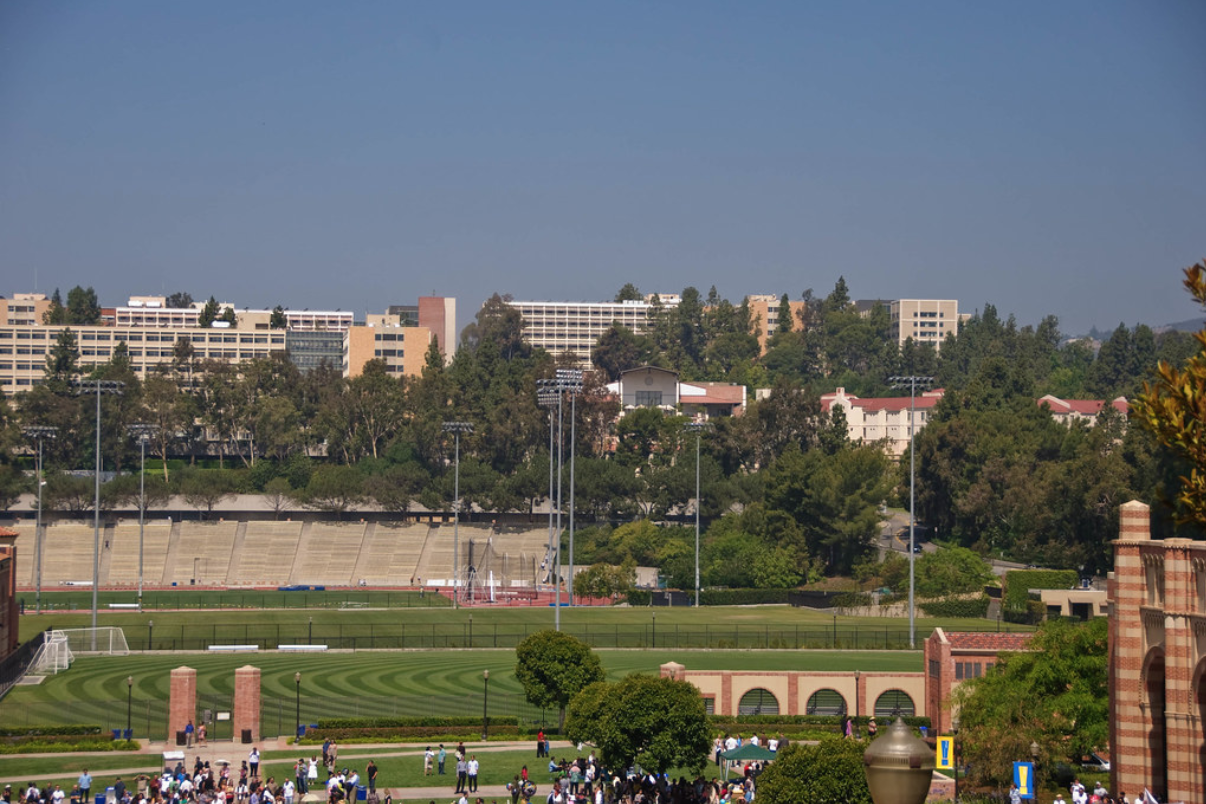Spring Town Hall on the Hill: Recap

Photo by dsopfe via CreativeCommons
On Monday May 6, the UCLA On-Campus Housing Council presented their Spring 2019 Town Hall in the Northwest Campus Auditorium. Representatives presented reports and listened to students’ concerns regarding UCLA Housing, Dining, Rooms Division, Maintenance, and UCPD/Security.
Housing Services shared concept art regarding future changes and construction of dining and residence spaces. Covel dining hall will be undergoing renovations and will be closed next spring quarter while the De Neve Grab n Go will change their menu to allow students to customize their food rather than being restricted by the menu. Furthermore, the current Lot 15 construction near Hitch and Saxon will become the new Centennial and Olympic residence halls.
For off-campus housing the construction of Gayley Heights on Gayley and Le Conte is underway, which will include a new unit-type of undergraduate apartments featuring two bedrooms and community space for six residents. Also, next to Weyburn Terrace there are plans for Warren Hall, which will have a mix of undergraduate and graduate apartments. Warren Hall will include a new unit type including four double bedrooms and two bathrooms for eight residents. The current housing construction aims to extend housing guarantees to a four-year guarantee from the previous three-year guarantee for incoming first-year students and a two-year guarantee for incoming transfers, a welcome extension as over-enrollment continues to be a problem for student housing.
Dining Services has installed vending machines near The Study at Hedrick as a pilot for a new dining service to be built in the new Lot 15 residence halls. For a meal card swipe the machine will provide an entree, a side, and a beverage based on the current selections at The Study, primarily sandwiches and salads. The pilot arose from students calling for healthy food options to be available between 2 a.m. and 7 a.m. when regular dining places are closed, leaving the vending machines throughout the Hill as their only food options.
The Sustainability Manager for Housing and Hospitality Services reported findings about composting on the Hill and their progress on their 2020 campus sustainability goals. Waste audits of residence halls conducted with the help of student groups found that 60 to 70 percent of waste generated on the Hill is compostable. In response, a pilot program was launched in Hedrick Court that switched landfill trash shoots for compost, added compost bins to bedrooms and bathrooms, and increased availability of compost bins in study spaces. The pilot program will continue into the summer in the hopes of extending the changes to all residence halls by the fall.
Their reported goal of reaching 20 percent sustainable food by 2020 is on track, with the Hill reaching 20.9 percent this past summer and reaching 18.3 percent in the fall, rising 3 percent from the previous year. Meanwhile, the campus-wide initiative of zero waste by 2020 is currently a work in progress, with 65 percent of all waste composted or recycled.
Two police officers from the UCLA Police Department reported about their 24/7 services available to all residents. They also spoke of their “Coffee with a Cop” event, which they aim to host at the beginning of each quarter, as a chance for students to meet and speak with police to build community bonds. Residents raised concerns regarding the number of officers in uniform at the “Coffee with a Cop” events, and the handcuffing students as part of protocol 5150, in which an individual is deemed a danger to themselves and others and is transported to a nearby hospital. The police officers acknowledged to have heard the concerns before, but cited the decision for a need for uniforms as the officers are on duty, and the need for handcuffs when an individual is deemed a danger to themselves and others.
Another resident brought up concerns regarding the Roebling block party from earlier in the quarter. Footage had circulated of officers detaining a Black individual as fireworks were set off amongst crowds mere feet away. One of the officers cited the incident as a traffic stop that began before the setting off of fireworks and fires started. He stated that the police officers witnessed a 24-year-old Black male who is unaffiliated with UCLA make two hand-to-hand narcotics deals. They reportedly released the individual afterwards with a warning for the possession of narcotics, possession for sale, selling, and a warrant for selling narcotics in the past, before the officers turned their attention to the block party. The police officer reported to have met with the USAC Campus Safety Alliance and other students since then regarding the traffic stop.
The use of harmful profiling techniques as white people set personal property on fire in the middle of the street begs the question of what priorities the UCPD operates under. The police officer made a point to state that while targeting and “stopping people for the color of their skin” may occur in other police departments, he insists that this doesn’t happen in the UCLA Police Department. Of course this is an ideal to strive for, but hand waving away a history of harm towards Black and Brown communities is worrisome to say the least.
The Northwest Auditorium was sparse with attendees, but the questions posed represented the general concerns of the student population, and the answers offered showed a willingness to listen. However, much of the information presented is lost on most UCLA students until the changes are implemented or heard through word of mouth.
Consistent communication between Housing Services and students would facilitate more engagement and quicker feedback, speeding up the process of improving students’ housing experience. Perhaps the recently released UCLA Housing app could hold the answer.




